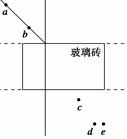阅读理解。
FeiXiang, whose English name is Kris Phillips, is a Chinese-American. He is nearly two meters, with
blue eyes, looking like an Asian. Though he was born in Taiwan, he grew up speaking Chinese to his
mother and English to his father and became a student at Stanford University in California. Later he
returned from abroad to Taiwan and became a singer.
In 1986, FeiXiang visited the mainland and turned into a big pop star there. He was well known
among the young people and his songs were widely accepted, such as "fire in the winter", "clouds of my
hometown” and so on.
He left the mainland for New York four years later. There he worked as a lowly member. He led a
quiet life in New York, for only a few people knew his name.
Now Phillips is planning to end his six-year stay in the USA and return to the mainland and his
recording career. His new projects introduce the mainland to the music of the roadway stage , including
the song "Maria" from "west side story"
1. Kris Phillips’ mother is ____ and his father is ____.
A. Chinese American
B. Chinese..Chinese
C. American American
D. English…American
2. Mr. Kris Phillips became as a big pop star ________ .
A. in the United States
B. in the place where he was born
C. in the mainland
D. at Stanford University
3. What is the order in which Phillips did the following things?
a. made a decision to return to PRC.
b. learned Chinese from his mother and English from his father.
c. was widely welcomed by the young people.
d. sang miss Saigon as a lowly member.
e. became a student at Stanford university
A. b e c d a
B. e b d c a
C. d e b a c
D. c a b e d
4. Feixiang is the best known in china for ____.
A. his plan to introduce the mainland to the music of Broadway stage
B. west side story
C. his performance
D. his special nationality
1-4: ACAC

